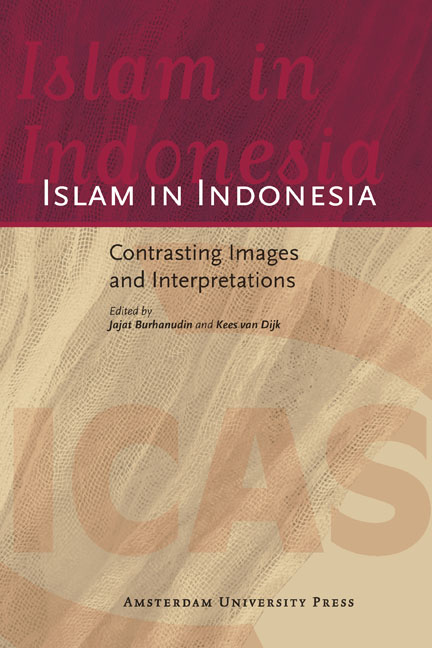Book contents
- Frontmatter
- Contents
- Introduction
- 1 Comparing Different streams of Islam: Wrestling with Words and Definitions
- 2 Defining Indonesian Islam: An Examination of the Construction of the National Islamic Identity of Traditionalist and Modernist Muslims
- 3 Indonesia in the Global Scheme of Islamic Things: Sustaining the Virtuous Circle of Education, Associations and Democracy
- 4 Distinguishing Indonesian Islam: Some Lessons to Learn
- 5 Islam, State and Society in Democratising Indonesia: A Historical Reflection
- 6 The Politics of Piety in the Pondok Pesantren Khusus Waria Al-Fattah Senin-Kamis Yogyakarta: Negotiating the Islamic Religious Embodiment
- 7 The Indonesian Muslim Feminist Reinterpretation of Inheritance
- 8 Managing Familial Issues: Unique Features of Legal Reform in Indonesia
- 9 A new Generation of Feminists within Traditional Islam: An Indonesian Exception
- 10 Religious Pluralism and Contested Religious Authority in Contemporary Indonesian Islam: A. Mustofa Bisri and Emha Ainun Nadjib
- 11 Islam and Humanitarian Affairs: The Middle Class and New Patterns of Social Activism
- 12 Dakwah radio in Surakarta: A Contest for Islamic Identity
- 13 Muslim Fundamentalism in Educational Institutions: A Case Study of Rohani Islam in High Schools in Cirebon
- 14 Majlis Tafsir Al-Qur’an and its Struggle for Islamic Reformism
- Glossary
- About the Editors and Contributors
- Bibliography
- Index
- Monographs
13 - Muslim Fundamentalism in Educational Institutions: A Case Study of Rohani Islam in High Schools in Cirebon
Published online by Cambridge University Press: 09 January 2021
- Frontmatter
- Contents
- Introduction
- 1 Comparing Different streams of Islam: Wrestling with Words and Definitions
- 2 Defining Indonesian Islam: An Examination of the Construction of the National Islamic Identity of Traditionalist and Modernist Muslims
- 3 Indonesia in the Global Scheme of Islamic Things: Sustaining the Virtuous Circle of Education, Associations and Democracy
- 4 Distinguishing Indonesian Islam: Some Lessons to Learn
- 5 Islam, State and Society in Democratising Indonesia: A Historical Reflection
- 6 The Politics of Piety in the Pondok Pesantren Khusus Waria Al-Fattah Senin-Kamis Yogyakarta: Negotiating the Islamic Religious Embodiment
- 7 The Indonesian Muslim Feminist Reinterpretation of Inheritance
- 8 Managing Familial Issues: Unique Features of Legal Reform in Indonesia
- 9 A new Generation of Feminists within Traditional Islam: An Indonesian Exception
- 10 Religious Pluralism and Contested Religious Authority in Contemporary Indonesian Islam: A. Mustofa Bisri and Emha Ainun Nadjib
- 11 Islam and Humanitarian Affairs: The Middle Class and New Patterns of Social Activism
- 12 Dakwah radio in Surakarta: A Contest for Islamic Identity
- 13 Muslim Fundamentalism in Educational Institutions: A Case Study of Rohani Islam in High Schools in Cirebon
- 14 Majlis Tafsir Al-Qur’an and its Struggle for Islamic Reformism
- Glossary
- About the Editors and Contributors
- Bibliography
- Index
- Monographs
Summary
Introduction
In his article published on the UIN (State Islamic University) Jakarta website, Komarudin Hidayat (2009: 1) mentions the successful infiltration of schools by Muslim fundamentalist Islamic networks, particularly senior high schools (Sekolah Menengah Atas, SMA), both private and public. He refers to the latest research conducted by the Pusat Pengkajian Islam dan Masyarakat (Centre for the Study of Islam and Society, PPIM) at UIN Syarif Hidayatullah Jakarta. He then stresses that the main factors behind this relatively easy and fast penetration are students’ impressionability and their lack of understanding of religious doctrines. Both factors have been exploited in the processes of brainwashing and indoctrination used by fundamentalist group activists.
In the last four decades, Muslim fundamentalist movements and radical ideas have gained ground. The resurgence of the mullahs in Iran in the late 1970s was a clear signal of Islam's revival in opposition to the hegemonic power of the infidel West. In Indonesia, the influence of this resurgence through a variety of media became visible in the late 1980s and early 1990s. Yet, it was not only the shi’a faction that thrived among Indonesian Muslims; in addition, Saudi Arabianbased Wahabi notions competed to win the hearts and minds of Indonesian Muslims.
Wahabi ideas were propagated in particular by the Dewan Dakwah Islamiyah Indonesia (DDII), which was founded in 1967 by former Masyumi leaders. The founding of the DDII was closely related to a new awareness among Muslim leaders that there was a real threat from a massive Christianisation movement, following the collapse of the Indonesian Communist Party (PKI). The fact that many former PKI supporters converted to Protestantism or Roman Catholicism opened the eyes of Muslim leaders to the fact that the dakwah movement was more critical in furthering Islam than the political battle that had clearly failed.
The dakwah movement instigated by the DDII was consolidated with the rise of corresponding ideas at a number of major secular universities, including the Institut Teknologi Bandung (ITB) and the Gadjah Mada University in Yogyakarta. Activists made university mosques their centres and organised halaqoh, an Arabic word that describes a sort of religious study circle where Islamic knowledge is transferred from teachers to students.
- Type
- Chapter
- Information
- Islam in IndonesiaContrasting Images and Interpretations, pp. 215 - 226Publisher: Amsterdam University PressPrint publication year: 2013



